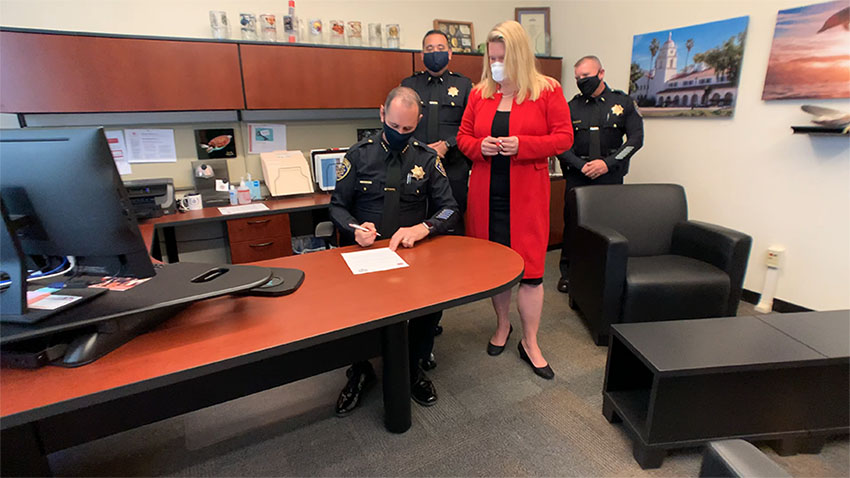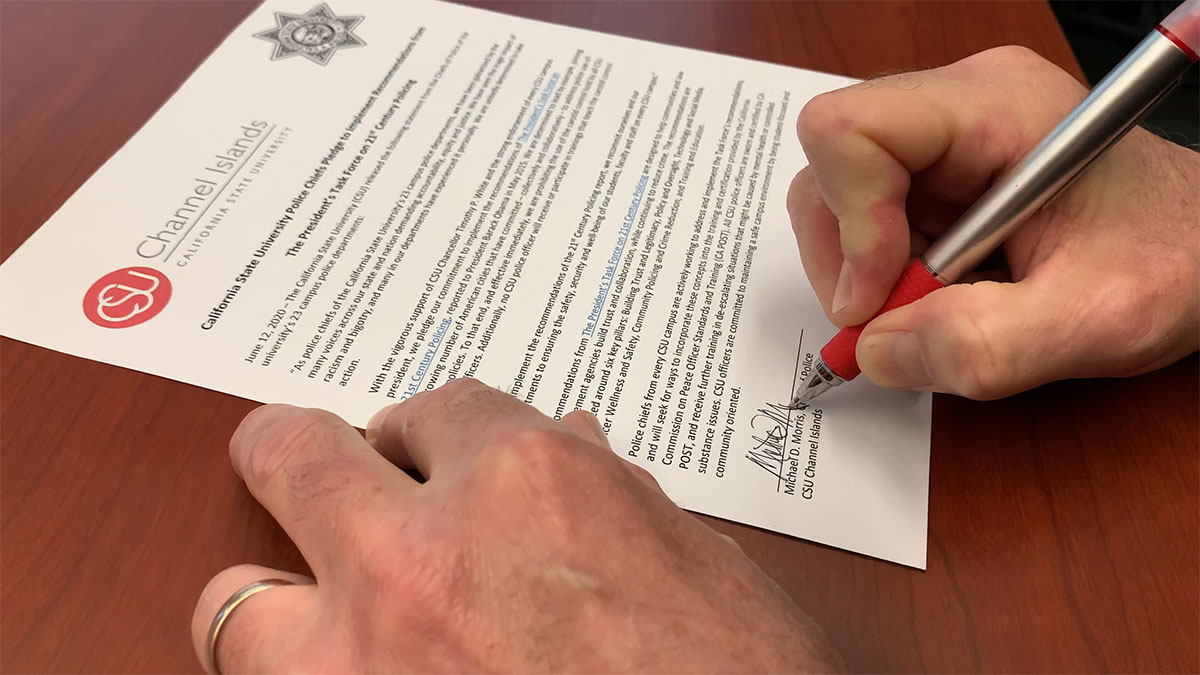 June 15, 2020 — Effective immediately, CSU Channel Islands (CSUCI) police officers will not use the carotid control hold to restrain a subject, and no officer will receive or participate in trainings that teach this form of control, which involves putting pressure on a person’s neck to control their movement.
June 15, 2020 — Effective immediately, CSU Channel Islands (CSUCI) police officers will not use the carotid control hold to restrain a subject, and no officer will receive or participate in trainings that teach this form of control, which involves putting pressure on a person’s neck to control their movement.
The action is part of a pledge by the police chiefs at all 23 CSU campuses to follow the public safety recommendations made by Obama’s President’s Task Force on 21st Century Policing, (PDF, 20MB). The task force responsible for making these recommendations was charged with “identifying best practices and offering recommendations on how policing practices can promote effective crime reduction while building public trust.” These recommendations were centered around the six pillars of Building Trust and Legitimacy, Policy and Oversight, Technology and Social Media, Communicating Policing and Crime Reduction, Officer Training and Education, and Officer Safety and Wellness.
“As police chiefs of the California State University’s 23 police departments, we have been galvanized by the many voices across our state and nation demanding accountability, equity and justice,” the pledge reads. “We have seen the tragic impact of racism and bigotry, and many in our departments have experienced it personally. We are unitedly determined to take action.”
CSUCI Police Chief Michael Morris expressed shock and disgust at the Minneapolis Police Department’s role in the death of George Floyd on May 25, and he wanted to take action as a result.
“As a group of chiefs, we’ve come together and are working closely as a team to advance our departments in a positive way,” he said. “At CSUCI, we have worked really hard to build and maintain strong trusting relationships with our community. But I feel as though the tragic events that have happened around the country require us to do more to ensure we examine our own policies and continue to build trust to ensure that our community feels that we are transparent and responsive to campus needs.”
President Erika D. Beck, Ph.D., expressed her pride in Morris’ willingness to take an honest inventory of the University’s Police Department policies to make sure they align with the recommendations put forth in the task force document.
“The CSUCI Police Department always goes above and beyond when it comes to keeping our students, staff and faculty safe,” Beck said. “Under Chief Morris’ leadership, the officers have placed particular emphasis on their mission of community policing, spending time at campus events and arranging events of their own to build relationships with and listen to our students, faculty and staff. I am committed to working with Chief Morris on expanding this commitment and working with our community to ensure we are implementing a collaborative and equitable public safety agenda guided by the ‘Public Safety Solutions for the 21st Century.’”
The CSUCI Police Department has implemented many of the recommendations of the President’s Task Force on 21st Century Policing, (PDF, 20MB) since Morris assumed his role as Chief in 2017, but the series of tragic events this year has refocused his attention to ensuring all of the recommendations are implemented by the CSUCI Police Department, in partnership with the academic community. The carotid hold has never been used on the CSUCI campus, and all officers receive training in de-escalation practices.
Some of the other task force recommendations already being practiced by University police include the use of body-worn cameras and the posting of police incidents and calls online. The department has also significantly increased their social media presence in recent years, but the work Morris is most proud of includes his new hires.
 “We have made really good progress hiring police officers who are honorable, educated and reflect the diverse makeup of our community,” Morris said. “And I absolutely demand that any individuals our officers come in contact with are treated with the utmost level of dignity and respect. Any discrimination, racism or disrespectful treatment will absolutely not be tolerated.”
“We have made really good progress hiring police officers who are honorable, educated and reflect the diverse makeup of our community,” Morris said. “And I absolutely demand that any individuals our officers come in contact with are treated with the utmost level of dignity and respect. Any discrimination, racism or disrespectful treatment will absolutely not be tolerated.”
Morris added that he also supports individuals who wish to express their beliefs through peaceful protest, and hopes that mutual respect between the University Police and the campus community will expand and result in healing, greater understanding and a more just and equitable future for everyone.
“The nature of police work is such that it has evolved many times over the years and will continue to do so,” Morris said. “We now find ourselves in a time where we need to intentionally and intently listen to our community, reflect on our values and evolve again. This moment gives us the opportunity, as well as responsibility, to do just that.”
